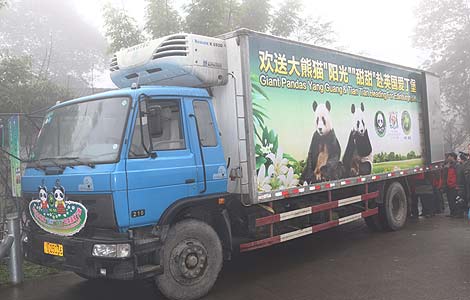Dancing with the wolves
Updated: 2011-12-09 08:20
By Wang Chao and Yao Jing (China Daily)
|
|||||||||
|
Great Wall Motor says it is watching the standards set by foreign auto firms to make successful inroads in Europe. [Provided to China Daily] |
WTO entry helps Great Wall Motor establish itself on global auto map
When China joined the World Trade Organization (WTO) 10 years ago, automobile industry experts had forecast a dismal period for domestic companies like Great Wall Motor. But in a reversal of sorts, not only has the industry gone from strength to strength during this period, it has also helped companies like Great Wall Motor make successful inroads in global markets.
Last month, at the Dubai international auto expo, Great Wall Motor launched its latest sport utility vehicle (SUV) Haval H6, after enjoying a successful run in the Middle East auto market.
Set up in 1984, Great Wall Motor is currently the biggest manufacturer and exporter of pickups from China. It also makes SUVs and sedans.
"Great Wall Motor will continue to expand by increasing exports, and also look to make inroads in mature markets like Europe and the United States, apart from setting up more factories," said Great Wall Motor Chairman Wei Jianjun.
From 1998, the company has been exporting its pickups to Iraq and Syria. In 2010, the company sold 55,000 cars overseas, accounting for 15 percent of its total sales, and was one of the top three exporters in China.
"We used to say 'wolves are coming' when China entered the WTO 10 years ago, as many were worried that the industry would be gobbled up by international auto 'wolves'," said Shang Yugui, media manager of Great Wall Motor, in a recent interview with The Economic Observer, "But now we are dancing with the wolves, beautifully."
Great Wall Motor began its journey as a pickup manufacturer in the 1980s. After China signed the WTO agreement, the company started to make SUVs.
In 2002, the SUV series developed by Great Wall Motor accounted for a major share of the SUV market in China. Buoyed by the domestic market success, Great Wall Motor began exporting the SUVs and shipped nearly 20,000 units in 2010.
"This is the first triumph we achieved since we entered the WTO," Shang said.
Wei, however, said that exports are not the ultimate goal for Great Wall Motor. "We want to enter mature markets like the US and Europe with high-end products."
In 2006, the company exported its Haval SUV to Italy, the first time that a Chinese SUV brand was tapping the European market.
Wei said Great Wall Motor is closely watching the standards set by European, Japanese and South Korean auto companies, to make successful inroads in Europe.
"We are studying the high-end cars in these countries, and hopefully we can increase the price of our products gradually by providing better quality," he said.
According to Wei, Great Wall Motor has been seeking the necessary emission standard approvals and other requirements for selling its products in Europe. In 2009, four Great Wall Motor models passed the Whole Vehicle Type Approval in European Union, giving it automatic access to all the EU countries.
"Over the last five years we have invested 3 billion yuan ($471 million, 347 million euros) in research and development to ensure that our vehicles meet the European emission standards," Wei said.
Based on WTO agreements, the protection period for the Chinese auto industry ended on July 1, 2006. After that date, car import tariffs were reduced from the original 80 percent to 25 percent, while tariff on spare parts went down to 10 percent.
"This is not only a challenge, but also an opportunity," Wei said. "We can now import spare parts at cheaper prices, and we have more suppliers to choose from."
In major overseas markets, Great Wall Motor builds completely knocked-down (CKD) factories to satisfy local needs.
"CKD is adopted in overseas markets to reduce shipping costs and to better utilize local resources," Wei said, adding that the company has CKD factories in Russia, Egypt, Indonesia and another nine countries.
"Our aim is to have 24 CKD factories by 2015, with an estimated production capacity of 500,000 units a year."
Sun Zhenyu, chairman of the China Society for World Trade Organization Studies, said the auto industry used to be what the government and economists worried most about.
"But now I will say the industry has thrived in an open environment," he said.












